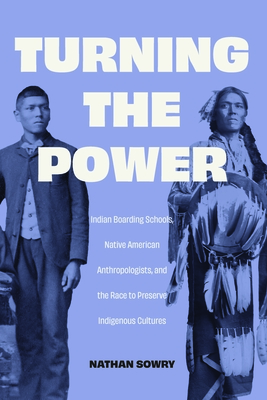In
Turning the Power Nathan Sowry examines how some Native American students from the boarding school system, with its forced assimilationist education, became key cultural informants for anthropologists conducting fieldwork during the late nineteenth and early twentieth centuries. Salvage anthropologists of this era relied on Native informants to accomplish their mission of "saving" Native American cultures and ultimately turned many informants into anthropologists after years of fieldwork experience.
Sowry investigates ten relatively unknown Native American anthropologists and collaborators who, from 1878 to 1930, attended a religiously affiliated mission school, a federal Indian boarding school, or both. He tells the stories of Native anthropologists Tichkematse, William Jones, and James R. Murie, who were alumni of the Hampton Institute in Virginia. Richard Davis and Cleaver Warden were among the first and second classes to attend the Carlisle Indian Industrial School in Pennsylvania. Amos Oneroad graduated from the Haskell Indian Industrial Training School in Lawrence, Kansas, after attending mission and boarding schools in South Dakota. D. C. Duvall, John V. Satterlee, and Florence and Louis Shotridge attended smaller boarding and mission schools in Montana, Wisconsin, and Alaska Territory, respectively.
Turning the Power follows the forced indoctrination of Native American students and then details how each of them "turned the power," using their English knowledge and work experience in the anthropological field to embrace, document, and preserve their Native cultures rather than abandoning their heritage.










